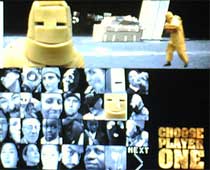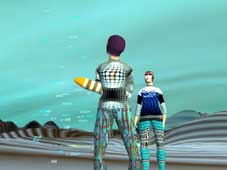Artgames. Structural analogies of art and game exhibition at the Ludwig Forum, Aachen, Germany.
(Part I.)
The exhibition had reserved a space to play with art games:
Borderland, by French artists Julien Alma and Laurent Hart, is based on video game duels such as Tekken or Mortal Kombat. But instead of superheroes or pop icons, the characters you control are old ladies, tramps, workmen, white and black teenagers who square up to fight each other against the backdrop of the suburbs of Paris that have become a desolated no-man’s land. 55 characters can fight each other in 280 settings – e.g. rubbish tips, car parks and building sites. What shines through the humorous surface is a picture of society in which everyone fights everyone else.

 fluID – Arena of Identities, by Mathias Fuchs and Sylvia Eckermann, is a mod of Unreal Tournament 2003 game engine. The videogame puts you into a terrain of identities where you start as a perfect nobody. You have got no face, no name, no clothes, no sex, nothing differentiates you from other players. You can discover and change your identity, steal or borrow another person’s identity, destroy identities or create new ones from scratch as you explore several virtual terrains (selectparks has an excellent review of the game.)
fluID – Arena of Identities, by Mathias Fuchs and Sylvia Eckermann, is a mod of Unreal Tournament 2003 game engine. The videogame puts you into a terrain of identities where you start as a perfect nobody. You have got no face, no name, no clothes, no sex, nothing differentiates you from other players. You can discover and change your identity, steal or borrow another person’s identity, destroy identities or create new ones from scratch as you explore several virtual terrains (selectparks has an excellent review of the game.)

The last game shown in the room is Nybble-Engine, by Max Moswitzer and Margarete Jahrmann,Âanother mod of Unreal Tournament. Players are assigned a place in the network. In the environment, they meet other players or the action bots (representations of server processes) and communicate with them via text messages. This generates network traffic, the server log files of which are routed to the game-Engine, where they serve as material for the 3D audiovisual displays of the installation. The Nybble-Engine tool converts the data from the network traffic into graphic clips that are projected on the screen. In this way, the server processes become visible outside of the game-Engine and the visitors influence the software of the Engine, eventually causing it to change its appearance (via V2_Lab).
